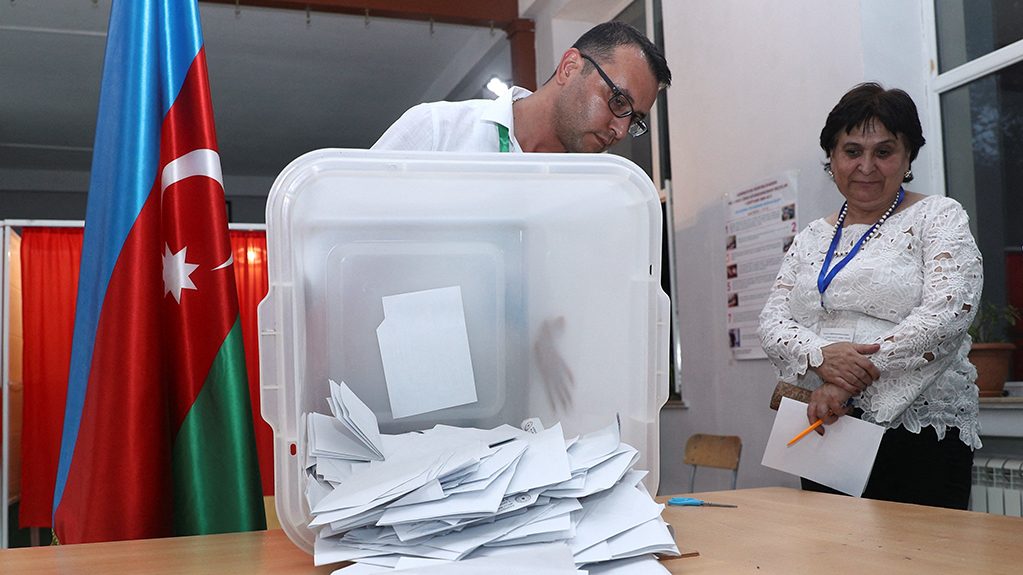The OSCE/ODIHR and the OSCE Parliamentary Assembly assessed the extraordinary parliamentary elections held in Azerbaijan on September 1. Observers noted that the voting took place under conditions of excessive restrictions on fundamental freedoms and the media, and that voters were not provided with political alternatives.
News
"These elections took place in a restrictive political and legal environment, the consequence of which was a lack of political pluralism coupled with the subdued and low-key campaign, all of which undermined the electoral process.
Furthermore, the dominance of ruling party affiliates within election commissions, alongside restrictions on access for independent domestic observers, run contrary to the principles of transparency and inclusivity, which are at the heart of democratic elections," said Michael Creed, Special Coordinator and leader of the OSCE short-term observers.
The OSCE reported that 6.4 million voters were registered for the elections, which is about 1.2 million fewer than the number of citizens of voting age. Observers noted that this discrepancy raises questions about the accuracy of the voter registration data.
The OSCE statement indicated that although preparations for the elections were conducted effectively and a comprehensive voter information campaign was carried out, the administration of the elections was effectively controlled by the ruling party, which affected its impartiality. Observers described the opening and voting process on election day as "orderly and efficiently organized," but reported serious violations of important procedures and safeguards, particularly during the counting of votes.
The OSCE noted that the election campaign was hardly visible on the Internet. Monitors received reports of public sector workers and others being forced to attend campaign events, which "raised concerns about voter intimidation and their ability to vote without fear of reprisal." Additionally, increasing cases of arrests and detentions of journalists and civil society activists, along with a restrictive legal framework for the media, have led to widespread self-censorship and severely limited opportunities for independent journalism. The political debate has been further hampered by the government's declared intention to monitor the Internet and social networks.
“In these elections, the lack of genuine choice and engagement that led to pervasive political apathy among the population was quite evident. Equally, the alarming trends of ongoing restrictions on media outlets and increased pressure on non-governmental organizations, including arbitrary arrests, decisively stifle political discourse. Without substantial reforms and change, these issues will continue to undermine democracy and rule of law in the country,” said Lucie Potůčková, Head of the OSCE PA delegation.
The OSCE's assessment indicated that the vast majority of civilian observers were appointed by the ruling party, while independent civilian observer groups remain unregistered or unfunded, with some of their prominent representatives in prison.
Ditmir Bushat, head of the OSCE/ODIHR observation mission, noted that “there was regrettably no genuine political pluralism in these elections, with numerous candidates who wished to participate facing serious obstacles” and there were restrictions that made it impossible for many citizen observers to work.
“Despite the efficiency of the process, these conditions did not allow elections to be held in line with democratic standards.
We stand ready to support the authorities in implementing our long-standing recommendations to improve the overall process, for the good of all citizens, said Ditmir Bushati, Head of ODIHR’s election observation mission.
The turnout for the Milli Majlis (Parliament) elections was only 37.27%. According to preliminary data from the Central Election Commission, the party of Azerbaijani President Ilham Aliyev won 68 out of 125 seats in parliament. Forty-six seats went to formally independent candidates, including the Ambassador of Azerbaijan to Russia and People's Artist of Azerbaijan, Folad Bulbuloglu, who was running for office in one of the districts of Karabakh. Small pro-government parties will distribute the remaining seats.
The largest opposition party in the country, the "People's Front of Azerbaijan," announced a boycott of the elections, while "Musavat" participated in the voting for the first time in 15 years. However, according to preliminary results, "Musavat" will not gain any seats in the new parliament. "Musavat" claims that the elections "were not free and fair" and demands the annulment of the results, the implementation of electoral reforms, and the holding of new parliamentary elections.
The Chairman of the Parliament of Georgia, Shalva Papuashvili, congratulated the authorities of Azerbaijan on the successful holding of the parliamentary elections. According to him, the Milli Mejlis now has a renewed democratic mandate from the Azerbaijani people to continue building a strong, prosperous, and united Azerbaijan.















